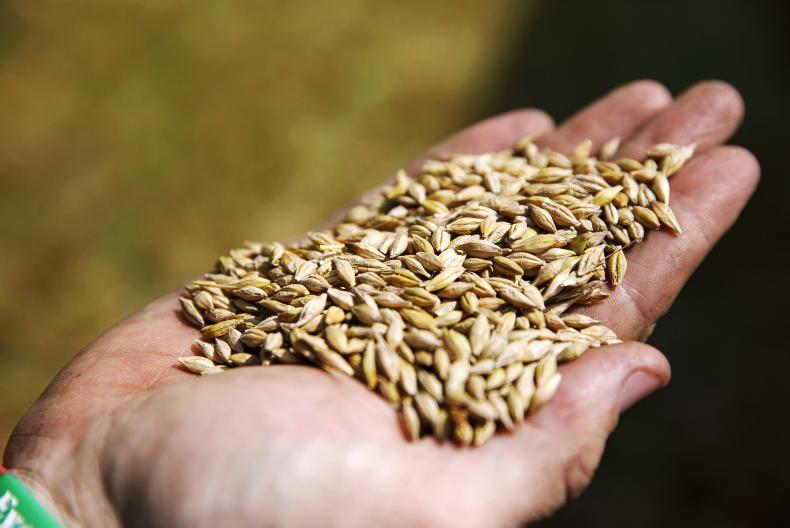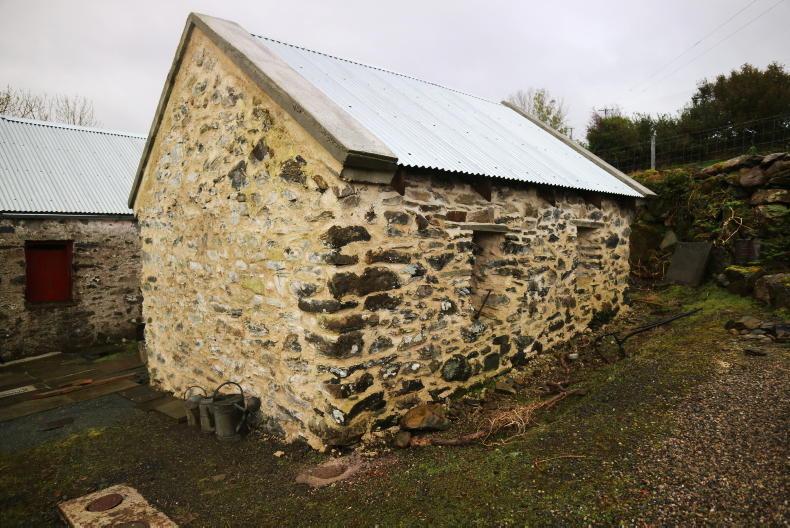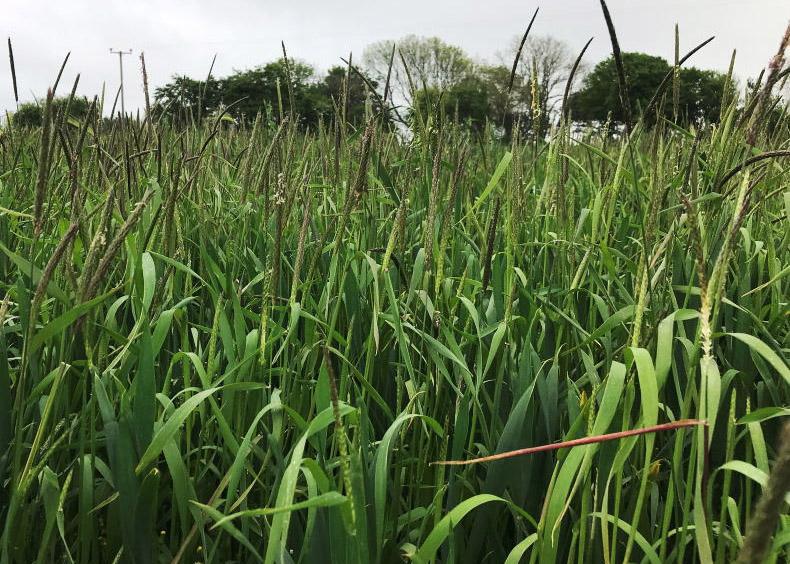Spring barley: Planet still a good bet
The area planted with spring barley is expected to decrease this year having reached 141,200ha in 2020, following a poor winter sowing campaign.
Winter cereal area has recovered this season, but spring barley will remain the dominant crop on farms across the country.
Planet remains the variety to beat on the recommended list released by the Department of Agriculture, with a relative yield of 102.
However, those who have grown the variety will know that straw breakdown can be an issue in a difficult harvest, while grain quality remains strong.
SY Errigal and SY Arderin are at a rating of 100 for relative yield. Errigal has a rating of seven for resistance to lodging – the highest on the list. Topping the charts for straw breakdown are Gangway and Arderin with a score of seven.
Highest for net blotch are Gangway and SY Errigal, while Prospect wins the battle against rhychosporium.
Gangway is a solid variety for those growing for feed and perhaps keeping their own barley. It has the top kilogrammes per hectolitre (KPH) on the list at 67. It has low screenings and a protein content of 11.3%.
Gangway is also the tallest variety on the list, just ahead of Planet, something that may be of interest ahead of the straw incorporation scheme’s introduction.
Spring oats: minor changes to ratings
There have been no new additions to the spring oat recommended list, with just a number of subtle changes to variety ratings. See Table 2. Keely, which was first listed in 2017, has been dropped, however. Delfin tops the yield rating this year, closely followed by WPB Isabel. First listed in 1985, Barra commands respectable grain quality but it rates poorly for resistance to lodging and mildew.
The tallest variety on the list, WPB Isabel, rates very well for lodging, straw breakdown and crown rust and also scores the highest for grain quality. Husky is the earliest ripening variety but its mildew resistance is back one point. Delfin has the highest mildew resistance rating on the list.
TGW is also back slightly on WPB Isabel and Husky this year. Kernel content is back across the board with the exception of WPB Isabel whose rating has increased marginally. Hectolitre weight rating has decreased in Delfin and Barra, while it has increased slightly in Husky and Isabel.
Spring wheat: provisional
recommendation for Hexham
The spring wheat variety Hexham has just gained provisional recommendation this year and will be distributed by Goldcrop. Hexham is a very high-yielding and moderately later-maturing variety. The variety is moderately resistant to lodging. However, it is moderately susceptible to mildew and Septoria spp.
It has very good resistance to yellow rust and good resistance to sprouting. Grain quality is good with a hectolitre weight of 76.9kg/hl, with a very high Hagberg falling number of 314, indicating its suitability as a milling variety.
KWS Chilham has been dropped from the recommended list this year and there have been subtle changes to the ratings of KWS Starlight and KWS Talisker. Both varieties are now fully recommended. See Table 3.
The first published data for lodging resistance on these varieties shows that KWS Starlight rates highly, at eight, while KWS Talisker comes in at five.
KWS Talisker’s mildew rating decreased by one while KWS Starlight’s resistance to sprouting reduced by two, down to five. The KWS Starlight rating for yellow rust also decreased by three to five.
Spring beans:
two recommended varieties
Boxer has been dropped from this year’s spring bean recommended list and no new varieties were added.
The list now contains just two recommended varieties, Fanfare and Lynx. See Table 4.
However, two varieties, Caprice and Victus, have completed three years in trial but were not considered for inclusion this year due to limited seed availability.
Lynx tops the yield rating this year and also has good resistance to lodging, chocolate spot and mildew resistance. Fanfare has the highest protein rating on the list and has good resistance to lodging and downey mildew.
Both varieties are just moderately resistant to rust however.
Spring barley: Planet still a good bet
The area planted with spring barley is expected to decrease this year having reached 141,200ha in 2020, following a poor winter sowing campaign.
Winter cereal area has recovered this season, but spring barley will remain the dominant crop on farms across the country.
Planet remains the variety to beat on the recommended list released by the Department of Agriculture, with a relative yield of 102.
However, those who have grown the variety will know that straw breakdown can be an issue in a difficult harvest, while grain quality remains strong.
SY Errigal and SY Arderin are at a rating of 100 for relative yield. Errigal has a rating of seven for resistance to lodging – the highest on the list. Topping the charts for straw breakdown are Gangway and Arderin with a score of seven.
Highest for net blotch are Gangway and SY Errigal, while Prospect wins the battle against rhychosporium.
Gangway is a solid variety for those growing for feed and perhaps keeping their own barley. It has the top kilogrammes per hectolitre (KPH) on the list at 67. It has low screenings and a protein content of 11.3%.
Gangway is also the tallest variety on the list, just ahead of Planet, something that may be of interest ahead of the straw incorporation scheme’s introduction.
Spring oats: minor changes to ratings
There have been no new additions to the spring oat recommended list, with just a number of subtle changes to variety ratings. See Table 2. Keely, which was first listed in 2017, has been dropped, however. Delfin tops the yield rating this year, closely followed by WPB Isabel. First listed in 1985, Barra commands respectable grain quality but it rates poorly for resistance to lodging and mildew.
The tallest variety on the list, WPB Isabel, rates very well for lodging, straw breakdown and crown rust and also scores the highest for grain quality. Husky is the earliest ripening variety but its mildew resistance is back one point. Delfin has the highest mildew resistance rating on the list.
TGW is also back slightly on WPB Isabel and Husky this year. Kernel content is back across the board with the exception of WPB Isabel whose rating has increased marginally. Hectolitre weight rating has decreased in Delfin and Barra, while it has increased slightly in Husky and Isabel.
Spring wheat: provisional
recommendation for Hexham
The spring wheat variety Hexham has just gained provisional recommendation this year and will be distributed by Goldcrop. Hexham is a very high-yielding and moderately later-maturing variety. The variety is moderately resistant to lodging. However, it is moderately susceptible to mildew and Septoria spp.
It has very good resistance to yellow rust and good resistance to sprouting. Grain quality is good with a hectolitre weight of 76.9kg/hl, with a very high Hagberg falling number of 314, indicating its suitability as a milling variety.
KWS Chilham has been dropped from the recommended list this year and there have been subtle changes to the ratings of KWS Starlight and KWS Talisker. Both varieties are now fully recommended. See Table 3.
The first published data for lodging resistance on these varieties shows that KWS Starlight rates highly, at eight, while KWS Talisker comes in at five.
KWS Talisker’s mildew rating decreased by one while KWS Starlight’s resistance to sprouting reduced by two, down to five. The KWS Starlight rating for yellow rust also decreased by three to five.
Spring beans:
two recommended varieties
Boxer has been dropped from this year’s spring bean recommended list and no new varieties were added.
The list now contains just two recommended varieties, Fanfare and Lynx. See Table 4.
However, two varieties, Caprice and Victus, have completed three years in trial but were not considered for inclusion this year due to limited seed availability.
Lynx tops the yield rating this year and also has good resistance to lodging, chocolate spot and mildew resistance. Fanfare has the highest protein rating on the list and has good resistance to lodging and downey mildew.
Both varieties are just moderately resistant to rust however.










SHARING OPTIONS